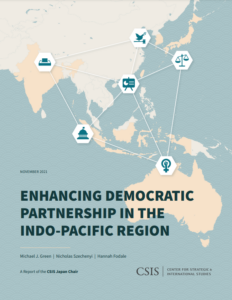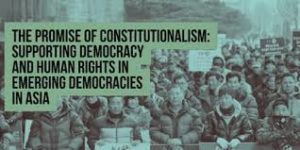Democracy and its advocates are undergoing an existential crisis as authoritarian resurgence externally and illiberal challenges at home seek to undermine the values and institutions underpinning the liberal international order, writes Lynn Lee, Associate Director for Asia at the National Endowment for Democracy (NED). The fact that President Biden made democracy an important priority for his administration is also significant, as the Summit for Democracy served as a timely opportunity to unpack aspects of the crisis in a constructive way and amplify the critical issues on our agenda, she told a recent CSIS event on “Enhancing Democratic Partnership in the Indo-Pacific Region” (above).
December’s Summit initiated a Year of Action that will lead to a second, in-person event a year from now, creating an opportunity to motivate and engage democrats around the world to imagine the possibilities if we came together in support of democracy and to defend liberal norms and values. Threats to democratic institutions, values and norms are manifest around the world, from Brazil, Hungary, and the US to the Philippines and Turkey. The last decade has shown how even the most established, mature democracies are vulnerable. We must defend, mend, and bolster the many aspects of democracy, and remain vigilant in recognizing that democracy and human rights should never be taken for granted.
 Democratic states in the Indo-Pacific region can leverage the Summit to explore how they can cooperate to maintain an order anchored in rule of law, transparency, media freedom, and respect for human rights and dignity. Through the Sunnylands Initiative, launched in January 2020 by CSIS, NED, and the Annenberg Foundation Trust, prominent democracy and thought leaders in the US and Indo-Pacific have explored how the region’s democratic states can collaborate or coordinate efforts to protect liberal democracies and strengthen the rules-based international order that has been the foundation for peace in the region. Building on the Summit’s momentum, I propose three action items for the Sunnylands Initiative as well as US stakeholders in the region to consider for the Year of Action and beyond:
Democratic states in the Indo-Pacific region can leverage the Summit to explore how they can cooperate to maintain an order anchored in rule of law, transparency, media freedom, and respect for human rights and dignity. Through the Sunnylands Initiative, launched in January 2020 by CSIS, NED, and the Annenberg Foundation Trust, prominent democracy and thought leaders in the US and Indo-Pacific have explored how the region’s democratic states can collaborate or coordinate efforts to protect liberal democracies and strengthen the rules-based international order that has been the foundation for peace in the region. Building on the Summit’s momentum, I propose three action items for the Sunnylands Initiative as well as US stakeholders in the region to consider for the Year of Action and beyond:
- First, we should support efforts to build an institutional infrastructure for civil society and other nongovernmental actors in the region’s democratic states to enable them to be at the forefront of regional efforts to defend and promote shared norms and principles. Asian civil society and nongovernmental stakeholders demand a meaningful regional framework for human rights and democracy, and their leadership and participation will be a key to achieving a successful democratic partnership, even in pushing their often reticent governments to take a stance on democracy issues. However, although domestic civil society groups are sophisticated, experienced, and committed to democracy, they lack the institutional infrastructure, socialization, and know-how to engage in democracy issues regionally or globally. The US and European countries have been involved in democracy support and democratic partnership building efforts for decades and have a number of government and nongovernmental institutions and mechanisms to channel their support. The Sunnylands Initiative and other concerned US partners should provide strategic support by sharing experiences and serving as resources for Asian democracy partners as they develop an institutional infrastructure of their own to work with other like-minded partners.
 Second, we should encourage Asian democracies to create a funding mechanism to support civil society and nongovernmental actors to take on leadership roles in regional and global initiatives to enhance democratic governance and a rules-based order. The ultimate way to counter authoritarianism, fight corruption, and promote respect for human rights is for democratic states and democrats to recommit and reassert our shared values and work in cooperation toward a common democratic agenda to maintain the liberal international order. This will not happen overnight—to strengthen the impact of this work to galvanize democratic governments, civil society, and other democratic stakeholders to repair and advance democracy on our home front, in the Indo-Pacific region, and around the world, we will need initiatives and support that goes beyond the second Summit. This will require financial commitments as civil society and nongovernmental efforts need sustained funding. Taiwan has the Taiwan Foundation for Democracy, but we need more than the TFD in the region, while at the same time, we should encourage Taiwan to drastically increase the TFD budget to support more civil society efforts in the region and beyond.
Second, we should encourage Asian democracies to create a funding mechanism to support civil society and nongovernmental actors to take on leadership roles in regional and global initiatives to enhance democratic governance and a rules-based order. The ultimate way to counter authoritarianism, fight corruption, and promote respect for human rights is for democratic states and democrats to recommit and reassert our shared values and work in cooperation toward a common democratic agenda to maintain the liberal international order. This will not happen overnight—to strengthen the impact of this work to galvanize democratic governments, civil society, and other democratic stakeholders to repair and advance democracy on our home front, in the Indo-Pacific region, and around the world, we will need initiatives and support that goes beyond the second Summit. This will require financial commitments as civil society and nongovernmental efforts need sustained funding. Taiwan has the Taiwan Foundation for Democracy, but we need more than the TFD in the region, while at the same time, we should encourage Taiwan to drastically increase the TFD budget to support more civil society efforts in the region and beyond. Lastly, we should strengthen existing regional democracy forums, networks, and institutions to function as intended, including the Asia Democracy Network, Asia Democracy Research Network, and Bali Democracy Forum. Instead of reinventing the wheel, we can empower and strengthen existing regional groupings and facilitate opportunities to connect democratic actors with existing regional networks and institutions so that they can forge partnerships and engage in high-level advocacy, including the anchoring of liberal norms and values in diplomacy,
Lastly, we should strengthen existing regional democracy forums, networks, and institutions to function as intended, including the Asia Democracy Network, Asia Democracy Research Network, and Bali Democracy Forum. Instead of reinventing the wheel, we can empower and strengthen existing regional groupings and facilitate opportunities to connect democratic actors with existing regional networks and institutions so that they can forge partnerships and engage in high-level advocacy, including the anchoring of liberal norms and values in diplomacy,  foreign policy, and trade, and implementation of the pledges and commitments Asian governments made at the first Summit for Democracy. Working closely with existing regional groups to implement Summit-related activities can better reflect the diversity of regional stakeholders and their democracy experiences as well as bring in the participation of democratic partners from countries whose governments are not democratic.
foreign policy, and trade, and implementation of the pledges and commitments Asian governments made at the first Summit for Democracy. Working closely with existing regional groups to implement Summit-related activities can better reflect the diversity of regional stakeholders and their democracy experiences as well as bring in the participation of democratic partners from countries whose governments are not democratic.
This blog post is based on remarks prepared for a CSIS moderated panel discussion (above), which focused on reactions to the first Summit for Democracy, the role of the US in supporting democratic partnership in the region, and potential actions Sunnylands Initiative partners can prioritize during the “Year of Action” leading up to the second Summit for Democracy in December 2022.







